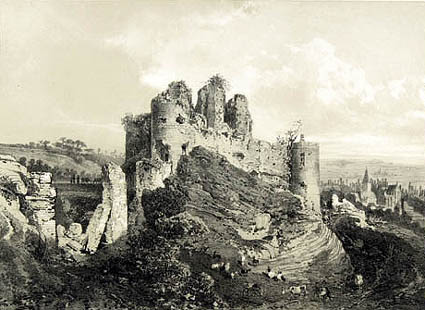![]() Affirmation
of ducal power
Affirmation
of ducal power
The proliferation of rebellions and private wars was countered throughout the kingdom through a movement of ecclesiastical reform which preached the Peace of God. William assumed control of this initiative for Normandy and imposed it in a council of peace held at Caen the day after his victory at Val-ès-Dunes (1047).
In order to impose his authority it was also necessary for the young Duke to ensure the succession. William planned a marriage which enabled him to conclude an alliance with an old enemy of the Duchy, the Count of Flanders. Matilda, daughter of Count Baldwin, was, however, a fifth generation descendant from a daughter of Rollo. In the eyes of the church this was a marriage of blood relations.
At the Council of Reims, which sat in 1049, Pope Leo IX had reason to be hostile to William who, in contempt of his prerogatives had given his half-brother, Odo, the bishopric of Bayeux. Furthermore, Leo IX was the declared enemy of the Normans who were attacking him in his estates in Italy. He declared his opposition to the marriage of William which none the less took place at Eu in c.1050.
 These
family politics worried the Richardides. Some were in open opposition, but
William reacted firmly. William Werlanc, Count of Mortain, was arrested and
exiled. William Busac, Count of Eu and William of Arques were besieged and
defeated in their castles and also forced into exile (1050-1054). All were
descendants, either legitimate or illegitimate, of Richard I and Richard II,
and in a position to dispute William's legacy. Similarly, Mauger, Archbishop
of Rouen, was deposed as unworthy in favour of Maurille, a reforming prelate
(1055).
These
family politics worried the Richardides. Some were in open opposition, but
William reacted firmly. William Werlanc, Count of Mortain, was arrested and
exiled. William Busac, Count of Eu and William of Arques were besieged and
defeated in their castles and also forced into exile (1050-1054). All were
descendants, either legitimate or illegitimate, of Richard I and Richard II,
and in a position to dispute William's legacy. Similarly, Mauger, Archbishop
of Rouen, was deposed as unworthy in favour of Maurille, a reforming prelate
(1055).
This last act was also a measure of the adherence to the principles defended by the Pope in order to relax his position on the marriage of William. Nicholas II (1058-1061) relaxed the interdict in c.1059 on a date which also corresponded to a return of the alliance of the Normans of Italy to his favour.